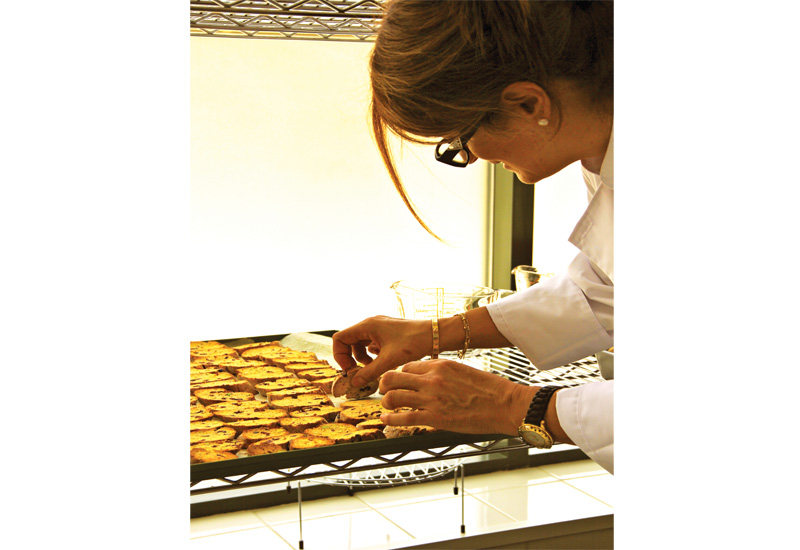Following last month’s launch of Dubai’s first 100% gluten-free kitchen comes news of a second such outlet for the region.
Coeliac disease awareness is growing across the F&B industry and more and more outlets realise they have to adapt their offering to capture this market share. Areej Jomaa launched Sweet Connection in August at the Dubai Investment Park, offering gluten-free alternatives to wheat based breads, pizzas, cakes, cookies and more.
“With so much of our food being mass produced these days, you can never be sure of cross-contamination from other manufacturing lines,” said Jomaa.

| Advertisement |
Abu Dhabi-based Blossom Sweets has launched a line of gluten free products consisting of walnut cakes and brownies. Aaron Maree, executive pastry chef, Blossom Sweets, said more outlets need to cater for this market but many are limited in their ability to do so.
“While customer numbers requiring gluten free products is growing, the dessert, bakery and pastry industry as a whole has not been fully supported by its suppliers offering as wide a range of ingredients as they need. Commercial packaging of spelt flour, gluten free mixes and even dietary sugars has not really been made available to the industry openly,” Maree told CME.
But as demand grows, hotels are becoming more aware of this need to adapt. The Ritz-Carlton Bahrain offers a gluten-free alternative to its home-made sorbets. Similarly Yas Viceroy Hotel, Abu Dhabi, creates gluten-free alternatives on request.
The Address Dubai Marina has launched a gluten-free afternoon tea in its lobby lounge Kambaa. Executive chef Nicholas Vass believes hotels could certainly do more to cater to the gluten-free market, but, he said, an education is necessary.
“Many chefs and bakers still don’t understand that making something with wheat flour alternative does not automatically make the product gluten free. If that product is still mixed, kneaded and baked in the same areas and ovens as normal wheat flour containing items then chances are the “gluten free” product you are trying to achieve will be contaminated.”
Jomaa agrees, adding that in this respect, stand-alones dedicated to a gluten-free operation have a better chance of succeeding than hotels, bakeries or pastry kitchens.
On the other hand, there is the argument that hotels can cater for the demand – as long as they prepare early on, said executive pastry chef for Ritz-Carlton Bahrain, Anthony Fernandez. But, he added, the demand is still fairly low: “The demand needs to be there to stand up on the market. They [hotels] might not do enough but, saying this, the demand is not that high.”
However, that’s not to say it’s an easy ride for a stand-alone gluten-free outlet. Maree believes restricting your offering could pose a problem or two: “Gluten-free only – I think it would struggle.
As with all businesses, it is a matter of targeting your market, specialising and not trying to be everything to everybody, but focusing on your core products and expanding the range from there.” Of course this again begs the question of cross-contamination.
Instead, Vass believes it is better to focus on the supply chain aspect, concentrating on the one field: “As a supplier they might do very well, especially if they tap into hotels and outlets that need these products but do not fully understand how to make them.”
Alongside demand are the challenges of hiring staff that understand the health risks associated with food intolerance; presenting these alternatives in an appealing way, but above all; the cost factor.
It’s no secret that gluten-free ingredients can be pricier to obtain than mainstream ingredients. But Michel Jost, executive chef of Yas Viceroy Hotel believes this will gradually change as demand grows and suppliers become more competitive to survive.
“Initially it may cost a bit more as one needs to go through the learning curve, but once the chef learns to structure the choices of menus and ingredients and knows where to source the alternative products, there is no reason why it would be more costly than any other meals.”
Maree agreed, adding that this demand will definitely see the trend continue to grow within the industry.
“With the demand on the rise I think we will start to see this go from a fashion niche to a mainstream demand and even in the industry, we will see the artisan pastry chef start to work to implement the basics required to fulfill the needs of the consumer,” he asserts.









 Search our database of more than 2,700 industry companies
Search our database of more than 2,700 industry companies









